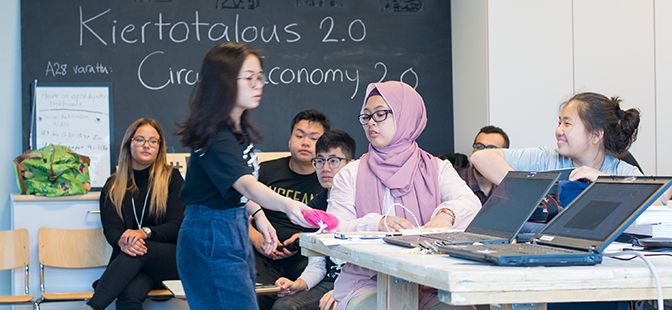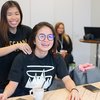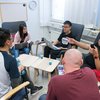
Student group from Singapore meets TUAS teaching methods and circular economy
Picking berries in the forest, corporate visits, group assignments. The multidisciplinary group of students from Singapore was immersed in circular economy during a course implemented by using the methods of innovation pedagogy, a learning approach developed at Turku University of Applied Sciences.
Photos: Martti Komulainen
The Singaporean students are seemingly inspired and motivated. They have explored circular economy for over a week from various perspectives, such as sustainable food systems. They have even gone blueberry picking in the forest and got to know the Finnish public right of access.
"The students are very active and ready for this practical way of studying in which the student has an active role. In other words, for studying that follows the principles of
innovation pedagogy,
" says Piia Nurmi, Research and Education Leader at TUAS and the leader of the course.
In addition to the Singaporeans, four TUAS students from different fields of study participated in the course. The Singaporean students, as well, are a happy mixture of different fields of study. And that was the purpose, too: a multidisciplinary group can access the core of innovation pedagogy, which is to combine different perspectives and work on ideas in a multidisciplinary manner.
Innovation pedagogy attracts interest abroad
During this course, circular economy – a practice to decrease consumption and the amount of litter and waste material – provides a context for learning. However, it is the multidisciplinary and practical learning approach of TUAS called innovation pedagogy that has attracted this group of students to Finland.
Innovation pedagogy is a method or, more accurately, a learning approach developed at TUAS and aiming at enhancing the innovation competences of students. This refers to, for example, group working abilities, international competence, communications skills as well as the ability to act as part of a multidisciplinary team. An important aspect of learning is to learn by doing in practice, for instance in projects implemented as assignments for businesses. This ‘real-world way of learning’ convinced also Sylvia Ler, Director of Student Development Office at Ngee Ann Polytechnic, who says that the course met their expectations perfectly.
The purpose of Ngee Ann Polytechnic is to promote students’ crossdisciplinary and innovative thinking as well as to offer experiences from abroad through Overseas Merit Fellowship (OMF) programme. This year, 40 out of 300 applicants were selected, and 20 came to Turku.

